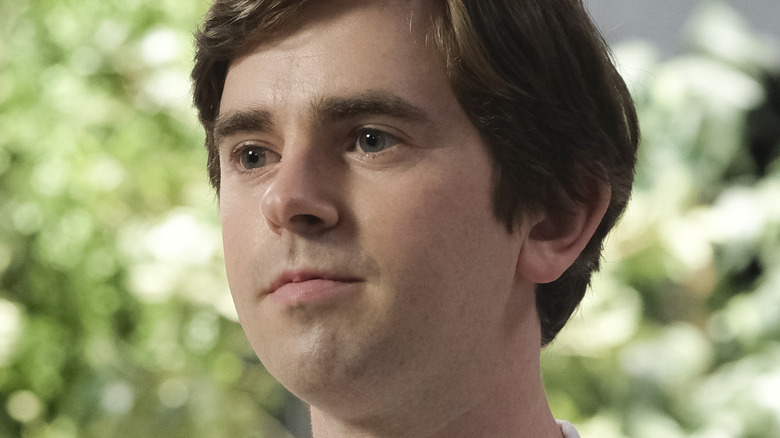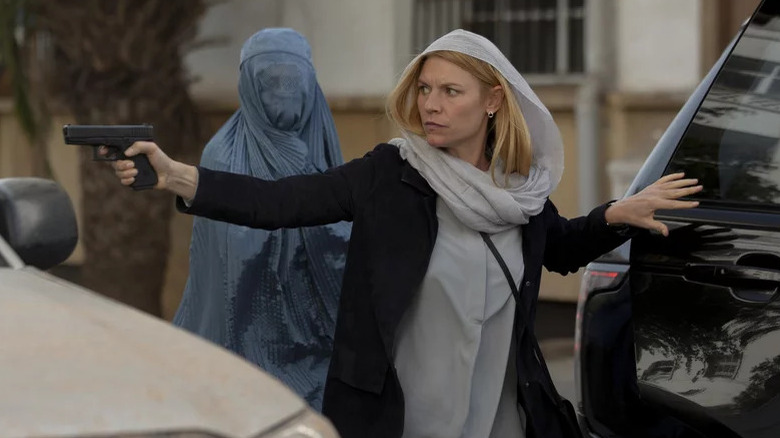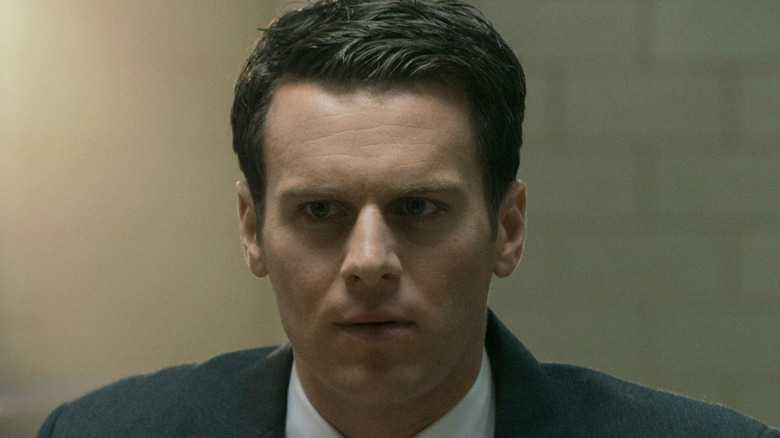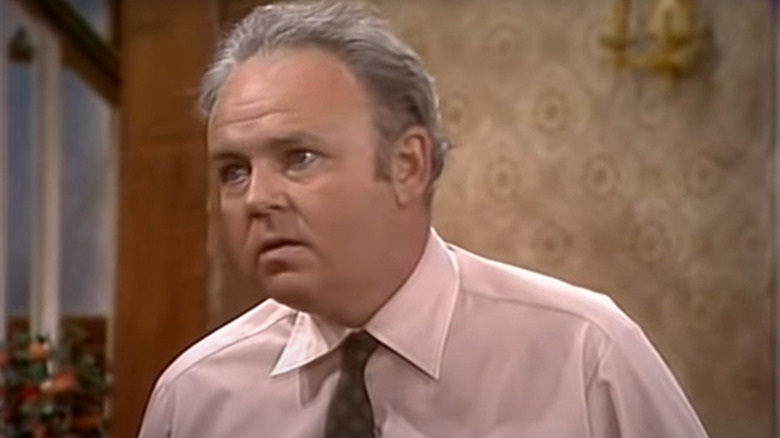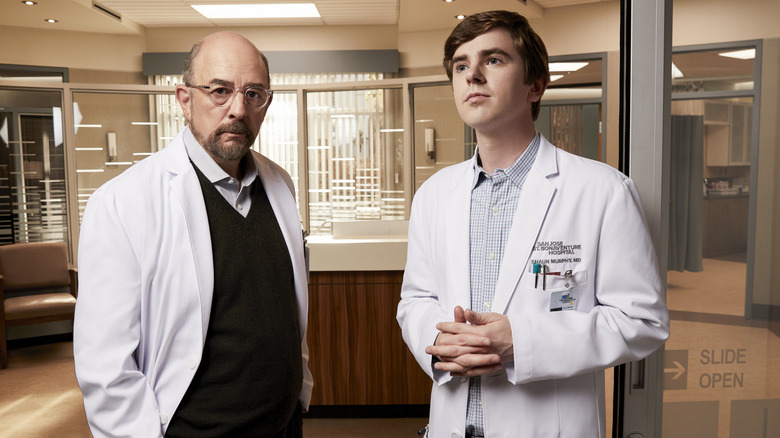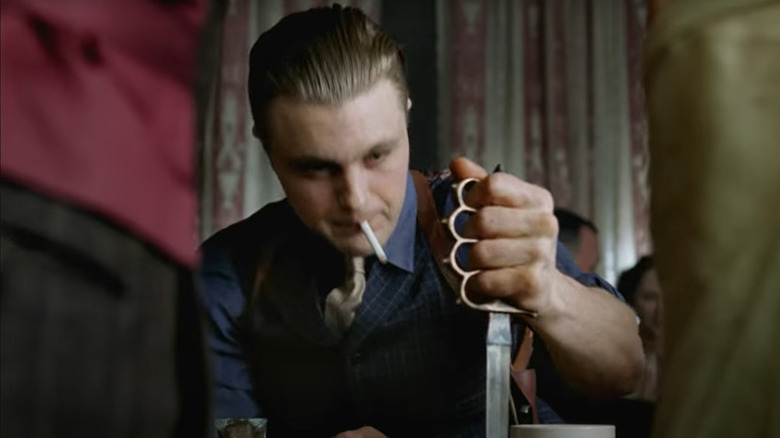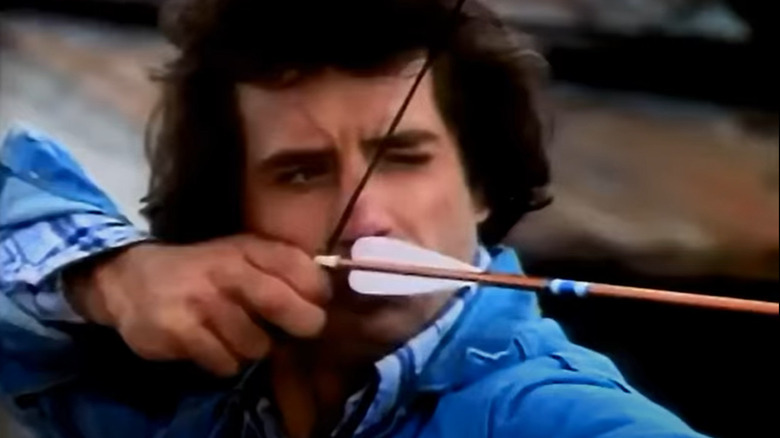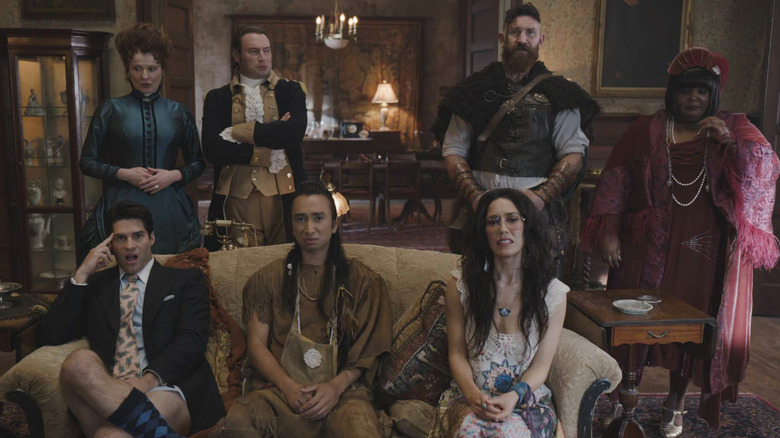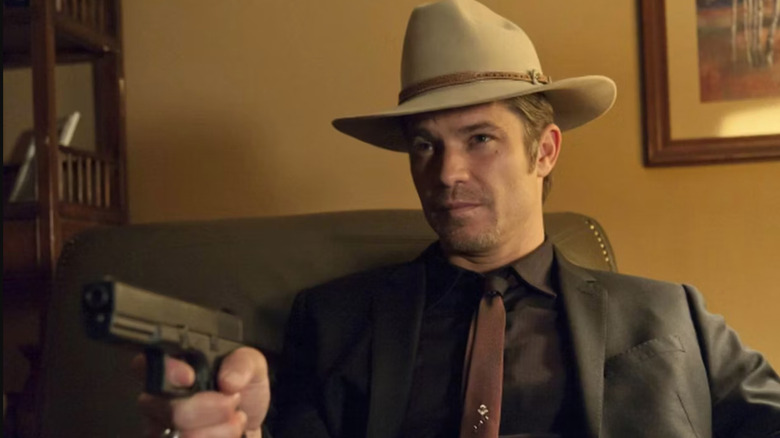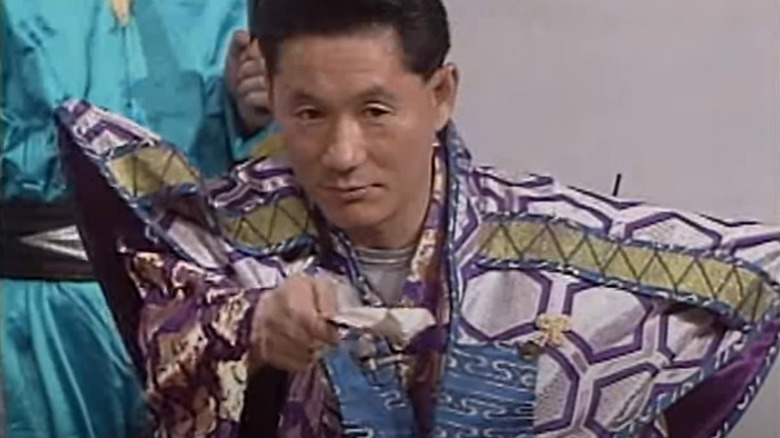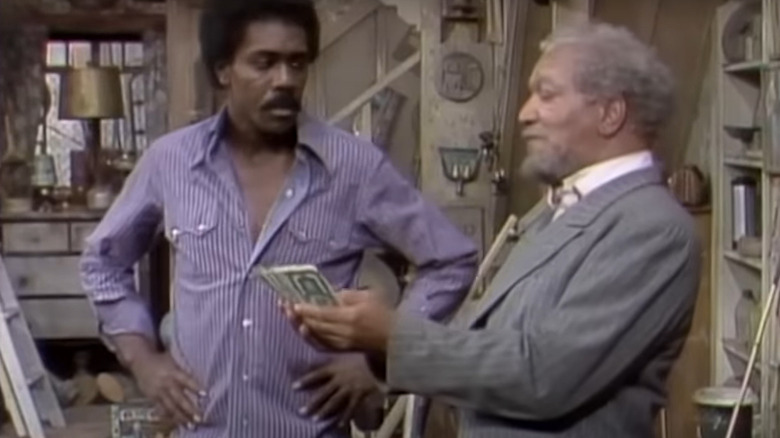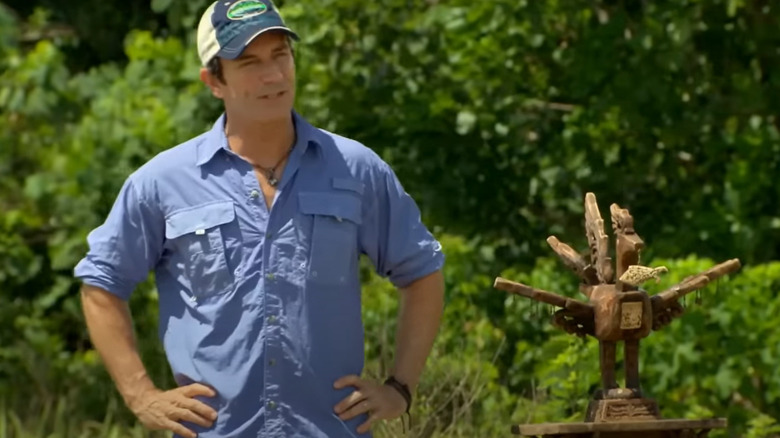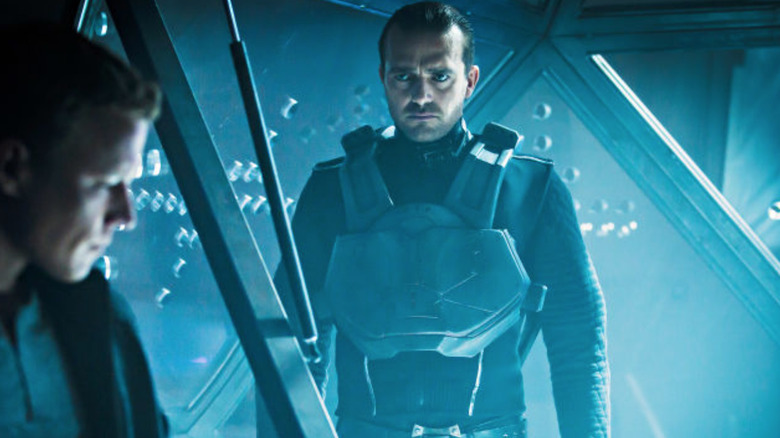12 TV Shows You Didn't Realize Are Adaptations
There have been many instances of a popular books becoming television shows over the years, with the "Game of Thrones" franchise perhaps being the most successful example. American remakes of television shows from overseas — "The Office," for instance — are also quite common. Whether pulling from fiction, non-fiction, previous shows, or even movies, many adaptations are widely publicized, but a few aren't talked about as much.
Some shows choose to adapt more obscure sources and end up becoming the de facto version of a story. Other shows end up moving so far beyond their source material that their origins become a distant memory as the series progresses. Sometimes an English-language remake is pumped out so fast that the original version doesn't have the chance to make its way abroad to wider audiences. Whatever the reason may be, these are 12 television shows you might not have realized are adaptations.
Homeland
"Homeland" ran for eight seasons on Showtime and follows the efforts of a CIA agent, played by Claire Danes, as she carries out espionage and counter-terrorism operations. With U.S. government agencies and American politics playing such a large role in the series, it is easy to forget that the first iteration of the show was made overseas.
The Israeli series "Hatufim," aka "Prisoners of War," provided the source material for what eventually became "Homeland." "Hatufim" hit the air in 2009 and no time was wasted getting a U.S. adaptation made. The first episode of "Homeland" debuted just two years later in 2011.
The creator of the Israeli series, Gideon Raff, remained involved in the U.S. adaptation as an executive producer and writer. Both shows begin with the core storyline examining a soldier who returns home after a period of captivity abroad. The first two seasons revolve around the suspicions that this returned POW may have been turned into a double agent while held prisoner and tasked with carrying out an act of domestic terrorism. However, "Hatufim" only ran for 24 episodes, whereas "Homeland" ran for 96 episodes. Instead of ending where the main plot of the source material concludes, "Homeland" moves on to new plotlines in future seasons, leaving one of the main characters from the first couple of seasons behind and broadening its scope.
Mindhunter
"Mindhunter" is a serial killer thriller series created by Joe Penhall and defined by David Fincher's signature directorial style. Though there were plans for a five-season arc, only two seasons of this Netflix original series have been produced thus far. The door remains ever-so-slightly open for the future, as the show was put on indefinite hold instead of being outright canceled.
The plot of "Mindhunter" follows two FBI agents played by Jonathan Groff and Holt McCallany as they interview serial killers, innovate the notion of criminal profiling, and found the FBI's Behavioral Science Unit. These characters are based on real people, with Groff's character in particular being inspired primarily by FBI Agent John E. Douglas.
After he retired from the FBI, Douglas wrote the non-fiction book "Mindhunter: Inside the FBI's Elite Serial Crime Unit." The television series was adapted from this book, though it does expand into fictional territory and further explore all of the characters involved. As revealed by co-star Holt McCallany, if the show is allowed to complete its full arc as intended, the two main characters will eventually retire from the FBI to begin working as Hollywood film consultants and write books using their expertise. Staying true to reality would mean the main character eventually pens the very book that the show is adapted from.
All in the Family
"All in the Family" is one of the most iconic American sitcoms of all time. Airing on CBS throughout the 1970s, this classic Norman Lear comedy follows the daily lives of the Bunker family while also introducing characters like Aunt Maude (Bea Arthur) and George Jefferson (Sherman Hemsley) who would both become the stars of their own spin-off sitcoms — "Maude" and "The Jeffersons" respectively.
Even though it is often thought of as a quintessential American television series, "All in the Family" is actually an adaptation of a British sitcom. "Till Death Us Do Part" first premiered in 1965 and was still on the air when "All in the Family" began in 1971. Carroll O'Connor's Archie Bunker character is a direct translation of Warren Mitchell's character Alf Garnett, and all of the core characters and dynamics are adapted directly between the two shows. As is often the case with American television shows compared to British television shows, the American version is much larger. "Till Death Us Do Part" ran for a little over 50 episodes, while "All in the Family" ran for more than 200. Similar to the U.S. adaptation, "Till Death Us Do Part" also received spin-offs, including a feature film version of the series by the same title, and a follow-up series produced in the '80s titled "In Sickness and in Health."
The Good Doctor
The ABC medical drama "The Good Doctor" began in 2017 and remains ongoing to this day. The series revolves primarily around an autistic surgeon, played by Freddie Highmore, as he makes his way in the St. Bonaventure Hospital in the face of prejudice. While it's logical to assume ABC's "The Good Doctor" must be an adaptation of the Orlando Bloom film "The Good Doctor" from a few years earlier, the two are completely unrelated despite sharing a title. The real source material for "The Good Doctor" comes from overseas.
In 2013, the South Korean medical drama "Good Doctor" laid the foundation for the English-language adaptation that would follow four years later. The storyline and main character are the same in both versions, with the major difference between the two iterations being that "Good Doctor" ends after just one season, as is common with South Korean television shows. The South Korean version of the story wraps up at the end of 20 episodes, whereas "The Good Doctor" is constantly introducing new narrative threads and leaving things open as it progresses past the 100-episode mark.
Boardwalk Empire
"Boardwalk Empire" is Terence Winter's gangster epic that ran for five seasons on HBO. With a massive ensemble cast of characters, the show tracks numerous storylines full of violence and crime. Though it intentionally deviates from reality in a few key areas, much of "Boardwalk Empire" is grounded in the real gangster history of Atlantic City and the various other locales visited throughout the show.
Providing the historical basis for the series was the non-fiction book "Boardwalk Empire: The Birth, High Times, and Corruption of Atlantic City." Though the book was first published in 2002, it was not a major success right out of the gate. The book was a relatively obscure piece of historical non-fiction before it was adapted into the HBO series. After the success of the show, the book was re-published using images from the TV series and delivered to a wider market than it had ever reached before. This seismic shift in attention made the book look more like accompanying material made for fans of the show rather than the initial source material for the series — although at that point, it was essentially both.
The Dukes of Hazzard
"The Dukes of Hazzard" ran for seven seasons on CBS from the 1970s into the 1980s. The show follows the Duke cousins and their extended, slightly messy family tree as they operate their moonshining business while running afoul of the local law and getting into plenty of scraps and car chases. For better or worse, the series became an iconic piece of American entertainment, with characters like Daisy Duke and Boss Hogg becoming household names. "The Dukes of Hazzard" is one television adaptation that has 100% eclipsed its source material in popularity and prominence.
The 1975 film "Moonrunners" laid the foundation for what eventually became "The Dukes of Hazzard." The film was written and directed by Gy Waldron, who also created the TV series. Both properties tell the stories of cousins working in a family-run moonshine business, except while the show follows Luke and Bo Duke, the film follows Grady and Bobby Lee Hagg. Uncle Jesse is a prominent character in both versions, but his last name was changed from Hagg to Duke for the show.
The TV show it spawned remains a television touchstone, but the "Moonrunners" film that led to it is a largely forgotten relic. The TV show has been rated more than 14,000 times on IMDb, while fewer than 400 IMDb users have bothered to rate the movie. Somewhat ironically, "The Dukes of Hazzard" TV series eventually got adapted back into feature-film form, except it would now retain its new title, further distancing itself from the original "Moonrunners" film.
Ghosts
One of the most recent sitcoms to catch on in the U.S. is CBS's "Ghosts." The series' first season aired in 2021, and it follows a couple who inherit a large home which turns out to be full of ghosts from different eras in history. One ghost is a Viking, another appears to be a hippie from the 1960s — you get the idea. You might have missed the news that this series is a remake as it was put together exceptionally quickly.
The U.K. show that "Ghosts" is based on, which is also called "Ghosts," features the same premise and some of the same characters, though certain ghosts have been exchanged for others. The British show only began two years earlier in 2019, and also remains ongoing. Since British television series typically have far fewer episodes per season than an American television show, the U.S. version of "Ghosts" quickly surpassed the original in its number of episodes within only half as many seasons.
Justified
The long-running FX show "Justified" is a Southern-fried crime series packed with plenty of action. U.S. Marshall Raylan Givens (Timothy Olyphant) goes up against plenty of unsavory villains throughout show, butting heads most frequently with Boyd Crowder (Walton Goggins). While the vast majority of "Justified" was an original creation by showrunner Graham Yost and his team of writers, the two central characters of Raylen and Boyd along with the plot of the pilot episode were adapted from a pre-existing source.
The core elements of "Justified" were taken from a short story written by crime fiction legend Elmore Leonard. The short in question was "Fire in the Hole," which was first included in his short story collection "When the Women Come Out to Dance" published in the early 2000s. Making matters more complicated is the fact that "Fire in the Hole" was not the first story to feature the Raylan Givens character. His first appearance is in Leonard's novel "Pronto." The very first scene of the FX TV series is taken from the ending of "Pronto." Raylan was also the protagonist of Leonard's novel "Riding the Rap" before "Fire in the Hole."
After the success of the first season of the television series, Leonard returned to the Raylan Givens character after a lengthy hiatus. He wrote a new novel, simply titled "Raylan," while the show was still on the air, and future seasons of the show adapted material from it. The television series concluded in 2015, but the Raylan character continues to live on in fiction form. Elmore Leonard passed away several years earlier, but his son, Peter Leonard, is also an author and picked up the adventures of Raylan. The latest entry in the continuing saga of the main character of "Justified" is 2018's "Raylan Goes to Detroit."
Most Extreme Elimination Challenge
One of the most bizarre examples of a television adaptation is "Most Extreme Elimination Challenge," which often goes by the abbreviated title "MXC." This comedic competition gameshow has contestants attempt a wide variety of dangerous physical feats, typically resulting in painful spills. The series, which aired on the now-defunct Spike TV for five years, can be thought of as a direct precursor to competition shows like "Wipeout." What makes "MXC" an exceptionally strange case is that it contains no footage that was originally shot for "MXC."
"MXC" is a bizarre case of U.S. producers buying up the rights to a Japanese game show and rebranding it. All the Japanese in the series is dubbed over with goofy English dialogue, turning the already comedic competition into a total farce. The original show was known as "Takeshi's Castle" and ran for over 130 episodes. The show was named after and hosted by Takeshi Kitano, aka Beat Takeshi, who was a massively successful comedian and later became an internationally acclaimed filmmaker as well.
Takeshi Kitano himself still appears in the rebranded "MXC," but his name has been changed to Vic Romano and he has been dubbed over by voice actor Victor Wilson. The U.S. adaptation also edited out all scenes involving Takeshi's titular castle, which functioned as the key set piece and the final stage of the competition in the original version.
Sanford and Son
The premiere of "Sanford and Son" in 1972 was a landmark moment for Black representation on television. This NBC sitcom centered around the junkyard business run by the titular Fred G. Sanford (Redd Foxx) and his son Lamont (Demond Wilson). The show ran for six seasons and received two spin-offs in the form of the failed "Sanford Arms," which was canceled after just a handful of episodes, and the slightly more successful "Sanford" now sans son, which was canceled partway through its second season.
While it is often thought of as a classic American sitcom, "Sanford and Son" is actually an adaptation of a British sitcom, though it made a couple of major changes right off the bat. Both shows focus on a father and son running the same type of business together while getting into comedic situations, but the main characters in "Steptoe and Son" are white. "Sandford and Son" creator Norman Lear had already found success adapting a British sitcom for the U.S. a couple of years earlier when he created "All in the Family," and he was able to duplicate this success.
The British progenitor was still on the air when the American remake started and ran for a total of eight seasons. Since British TV seasons are much shorter in general, the full series had fewer than half as many episodes as its American counterpart despite being on the air for two extra years. The British show didn't receive any TV spin-offs like its remake, but it did receive movie spinoffs in the form of "Steptoe & Son" and "Steptoe and Son Ride Again."
Survivor
The reality show "Survivor" is one of the longest-running of its type. With more than 40 seasons spread over the course of two decades, the show has amassed a ludicrous total of more than 600 episodes. Blending the game show and reality TV formats, "Survivor" has a group of contestants competing for a one-million-dollar prize while living on a supposedly deserted island.
Despite the series frequently being hailed as groundbreaking television, it wasn't an original concept. The concept for "Survivor" as a reality competition show set on a deserted island originated in Sweden in 1997 with the series "Expedition Robinson." This originator has proven similarly successful with nearly 500 episodes to its name, but it never broke out as an international hit in the way that "Survivor" did. When the format expanded further to other countries, "Survivor" became the de facto point of reference. Future iterations kept the first adaptation's title, such as in "Australian Survivor" or "Survivor South Africa," while "Expedition Robinson" was left behind in the dust.
Dominion
The Syfy network original series "Dominion" ran for two seasons before getting the ax due to a steep decline in ratings during Season 2. The show uses a futuristic setting to showcase a war for the fate of the world between humans and angels, with a particular focus on one angel played by Tom Wisdom who switches teams and fights against his own kind. There are several books and films titled "Dominion," but this series pulled its inspiration from a work by a different title.
The 2010 action, horror, fantasy hybrid "Legion" served as the source material for "Dominion." The film uses a smaller scale but looks at the same war between angels and humans, this time setting the conflict in a small roadside diner. The archangels Michael and Gabriel are key players in both "Legion" and "Dominion," though the casts are completely different with Paul Bettany and Kevin Durand filling the roles in the film, and Tom Wisdom and Carl Beukes playing the characters in the series. "Legion" is a bit of an odd choice of a film to adapt into a series given that the critical and audience response to the film were quite scathing, but the creators got another shot to pull off the concept. The director of "Legion," Scott Stewart, returned to direct the pilot episode of "Dominion" and the two properties also share some of the same producers, crew, and VFX artists.
